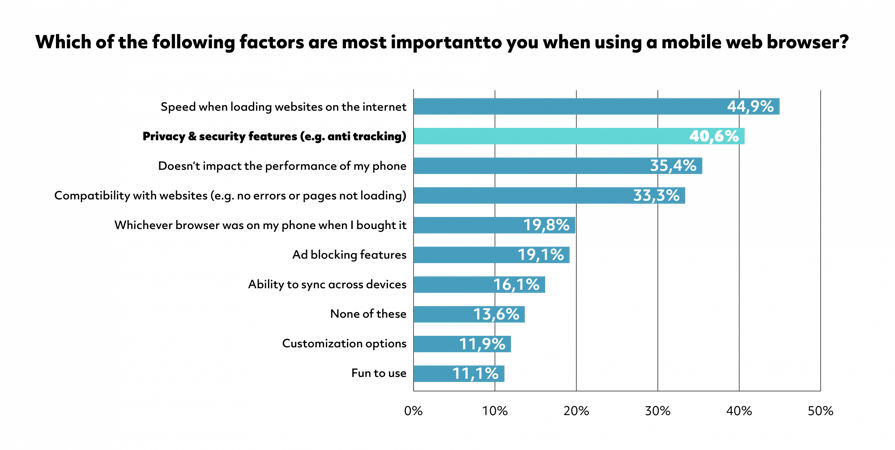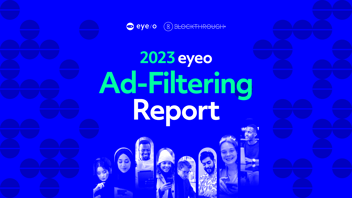Data Governance and User Empowerment: words to live by in 2022

We recently contributed a series of privacy-related questions to a GWI study of 4,009 UK and US users. To achieve a more balanced and fairer digital world, it's essential to listen to users' voices, especially when it comes to their privacy. As an additional bonus, the results were quite inspiring, as we saw how the views of those users dovetailed with our own. As a company vested in fostering data privacy as a basic human right, it's further proof that we’re on the right path.
Excited to see what users had to say? Let’s go through some of the results.
Factors influencing comfort with data sharing
It is no surprise that the two highest ranking responses — 60.9% and 59.3% — regarding the most important factors for a user to know before they’d feel comfortable sharing data are, how will my data be used? and how will my data be protected? As we’ve seen, it's exactly this lack of transparency that is driving the new data privacy revolution. Users want to be a part of the discussion. They want to know just how and in what ways companies are profiting from their personal information. How can a user feel safe if the rules of the game are not clear? The following highest ranked factors attest to that further: Why are they collecting it (data)? and will my data be anonymous?
Our data is precious and sensitive, and thus it is of paramount importance to empower users by pushing for better industry practices and educational efforts. Informed stakeholders can, and should, establish functional data governance models that account for these aspects.
Online data sharing
What is interesting about the results from the second question, “Which of the following data types, if any, are you willing to share with an app or company” is that they represent the most basic information, things that are not used to easily identify a specific individual. These broad, large-level data types don’t narrow the spectrum in the way your medical history or bank data would.
To wit, 65.1% responded they are okay with sharing their gender, 55% their country and 51.9% their language (the second and third of which are generally practical as first-party information on favorite websites to save some settings for user convenience). Whereas only only 28.5% wanted to share their history of past purchases, i.e. information that narrows in on them as individuals.
Currently topics-based targeting is one of the most interesting proposals brought forth by the industry as an alternative to profiling users — our privacy product Crumbs and Google’s Topics API being two possible viable solutions in this vein — and these results show that it's exactly this need to avoid being too closely identified as an individual that most concerns users.
Factors influencing browser choice
So this all leads to the big question: which browser should I use then? What factors are most important to me when using a mobile web browser?
Of course, it’s no surprise that the first-ranked answer was performance related, the speed when loading websites (44.9%), but what is highly interesting is that a close second (40.6%) was privacy & security features (e.g. anti tracking). Performance has always been, and will always be, a primary consideration when choosing a browser, and yet, it speaks volumes to the current moment in the online environment that right next to performance is privacy. It's no longer a buzzword. The data revolution really is in the here and now. And companies will need to respond to these user needs or fall behind the times, or risk noncompliance with changing GDPR or CCPA (state law in California) governance, to name a few.

Moving forward and continued discourse
An active approach toward transparency and working with users to find sustainable solutions, as with topics-based data collection, is the way forward and the path we’re forging at eyeo.
Because we believe the discourse around this topic is so important, our CRO Jan Wittek recently presented a session at MozFest titled “The Next Data Revolution”, where he focused on just these topics of end-users’ data, with an emphasis on empowering users by giving them the means to control and benefit from how their data is used.
This is something that we want to continue doing, being as much a part of the conversation as possible, and helping our partners and their users to have the peace of mind that comes from transparently handling user data across the industry. We believe that fostering user privacy is not a hindrance for businesses, but rather a unique selling point, as it is exactly this kind of prioritization of privacy that will define the internet moving forward. Not only that but it shows that they are listening to users’ voices, which is not only good business but essential for the digital world.
If you missed our session at MozFest, you can watch the recording here. Please note that you need to register on Mozilla’s platform to do so.




